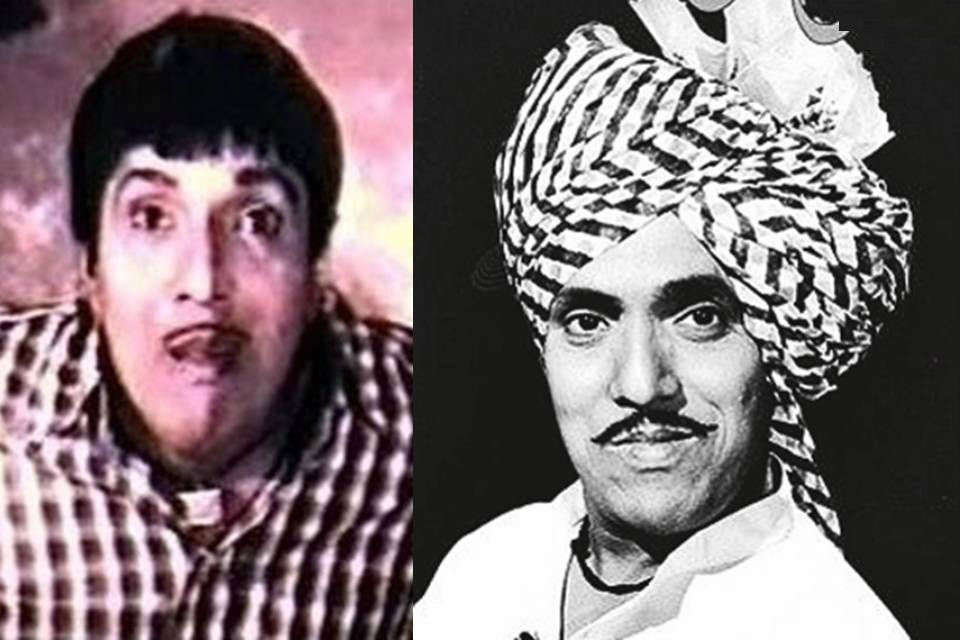In the era of biopics, it would be fascinating to see if the most ambitious and intelligent directors, along with talented actors, could successfully create a biopic on Dada Kondke. Dada Kondke, a legendary figure, revolutionized the Marathi film industry, overshadowing doyens like V. Shantaram and Dr. Jabbar Patel. He single-handedly established a new school of filmmaking and achieved the extraordinary feat of making nine consecutive golden jubilees, earning him a place in The Guinness Book of Records.
From Naigaon Gullies to Cinematic Stardom

Transition to Theatre and Film Success
/bollyy/media/post_attachments/9976eb9f8b810f5b175058952c3a199e50fcd729d1f05ecc9a1a595e3a454d8c.jpg)
Dada Kondke then ventured into directing popular Marathi plays based on social issues in Maharashtra. His unique brand of double-meaning words drew massive audiences, disrupting traditional Marathi theatre. He soon transitioned to Marathi films, creating nearly twenty films over a decade. His iconic character, often dressed in chaddis and a Gandhi cap, resonated with the masses and even the elite. This character, reminiscent of Chaplin and Raj Kapoor, tackled government corruption, religion, and societal issues, making him a revered figure across the media.
Challenges and Triumphs in Filmmaking
/bollyy/media/post_attachments/f1796729de4a959090d08e44dc1405941aa67d74a44482c0f82e7d4e332b2fab.jpg?w=414)
/bollyy/media/post_attachments/5d1cc08554604106adb6c01f97c932ff30d1d26d6fbad93b3451d47cdd7a7962.jpg)
/bollyy/media/post_attachments/e4101983ee7b32bb2818610fe1c68a4d397a2b0aefc50a34291a26a8bb025c50.jpeg)
Dada Kondke faced numerous battles with censors due to his double-meaning dialogues and portrayal of women. However, he ensured all his films were released and commercially successful, setting trends that many attempted to follow. He ambitiously produced, directed, and acted in Hindi films with titles like "Tere Mere Beech Mein," "Kholde Zabaam Meri," and "Aage Ki Soch," featuring stars like Mehmood and Amjad Khan. Although these films didn't achieve the success of his Marathi ones, his legacy in acting and filmmaking remains unparalleled.
My Personal Encounter with Dada Kondke
/bollyy/media/post_attachments/2860d5651a3717b46bc3dace488e7d0b887c7224d3db82ddc8d0f2d9db4e626e.jpg)
I had seen all his films, including his less successful Hindi ones, and was eager to meet him. Through Mr. Kalguatkar, a leading PR man in the Marathi industry, I arranged a meeting with Dada Kondke. The meeting took place at the Bombay Air-conditioned Market in Tardeo. I arrived early and found a man dressed in a loose white pyjama and kurta, sitting on the floor. We conversed in Marathi about various subjects, and he entertained me with his witty commentary on Marathi films.
A Memorable Meeting and Lasting Friendship
/bollyy/media/post_attachments/d364ee979bd06eebc5ccc833bd1530bdae17182717e5d1923e2bf3c4054bb3f0.jpg)
/bollyy/media/post_attachments/a3552c8a3a61655761c5f9a1ffacee0fd30b7200b38d5ed185215dc17acc7f93.jpeg?w=414)
After an hour of conversation, I revealed I was waiting for Dada Kondke. To my surprise, the man I was talking to was indeed him. We laughed at our mutual mistake and continued our discussion in his fully decorated office. He shared his early experiences in street theatre, public theatre, and films, expressing surprise at his immense popularity. He candidly criticized the Mangeshkar family for refusing to sing in his films, showcasing his irreverence towards established norms.
The Decline and Legacy of Dada Kondke
/bollyy/media/post_attachments/191933cdd820c8feece4f207ecea15d69a5df9bde596935f662b25dba44ad70c.jpg)
As his health declined, Dada Kondke faced betrayal from his brother, who mismanaged his finances. He spent his last days at the National Hospital (now Hinduja Hospital), with only his wife, Usha Chauhan, by his side. Critics often compared him to Manmohan Desai, a comparison he didn't favor. Despite his challenges, Dada Kondke's unique style and contributions to Marathi cinema make him a legend, whose story deserves a well-crafted biopic.
Conclusion: A Challenge for Future Filmmakers
Creating a genuine biopic about Dada Kondke is a significant challenge for any filmmaker. His eccentric genius and unparalleled impact on Marathi cinema make him a compelling subject. Like the biopic on Kishore Kumar, capturing Dada Kondke's essence would require exceptional talent and dedication. I encourage filmmakers to take up this challenge and bring the story of this extraordinary figure to life.
/bollyy/media/post_attachments/d473f69c-d83.jpg)
Read also:
/bollyy/media/agency_attachments/RkUxgq2cnt6TBhWqptvt.png)
/bollyy/media/media_files/c6nGBDNZKgVNB52srbJQ.png)
 Follow Us
Follow Us/bollyy/media/post_attachments/2b963f44bc418698b8fdee3548dcf7f65b19101f708e271caca291f6b3a322d2.JPG)